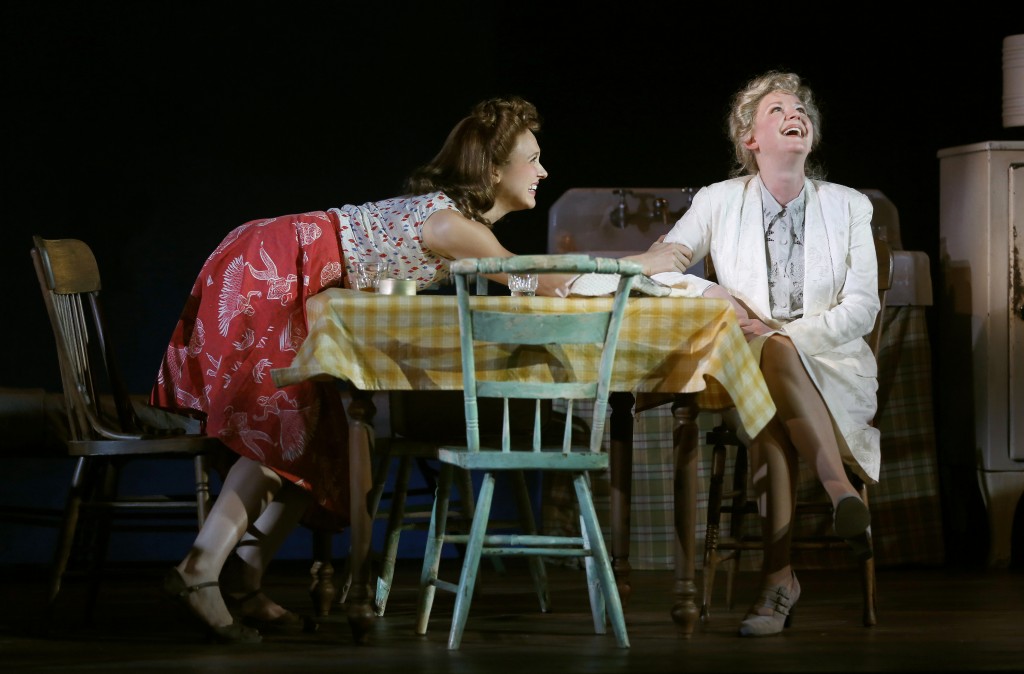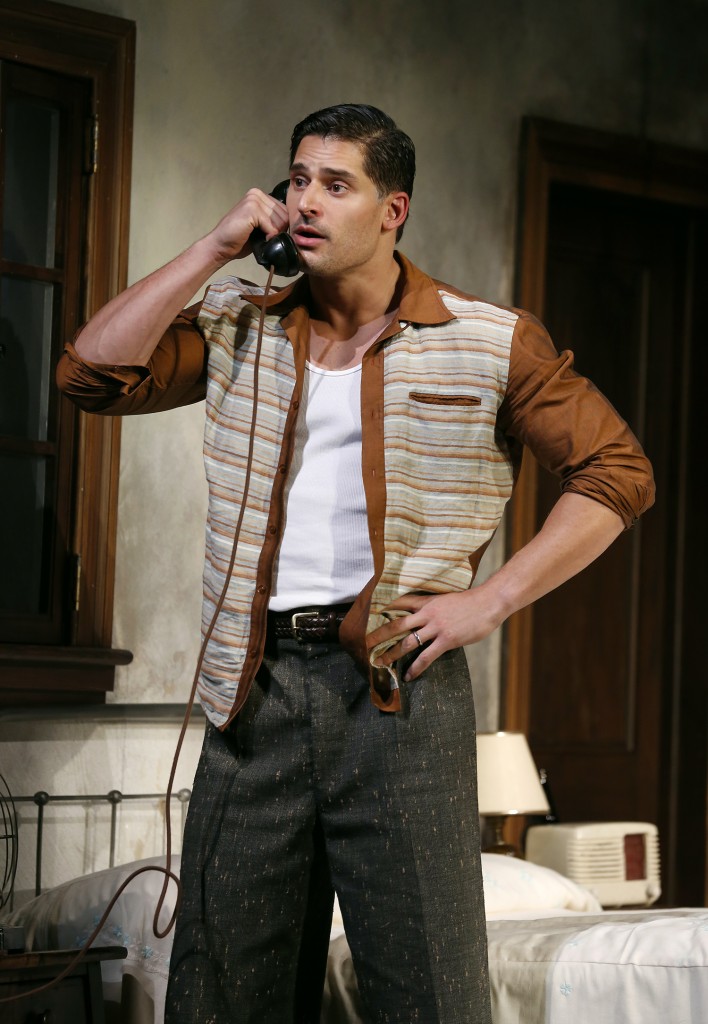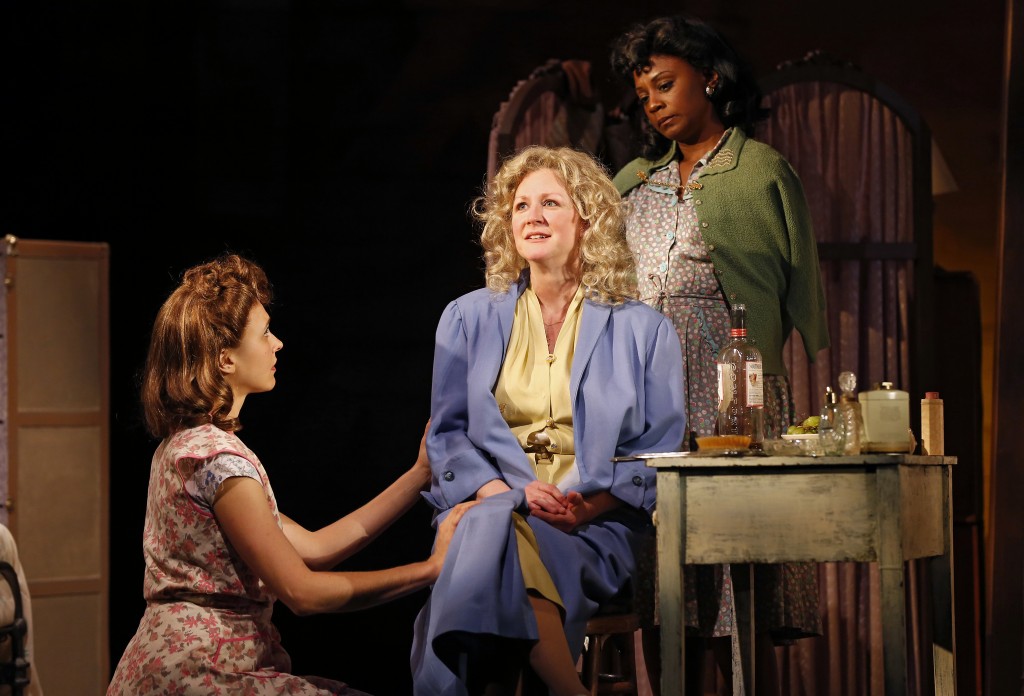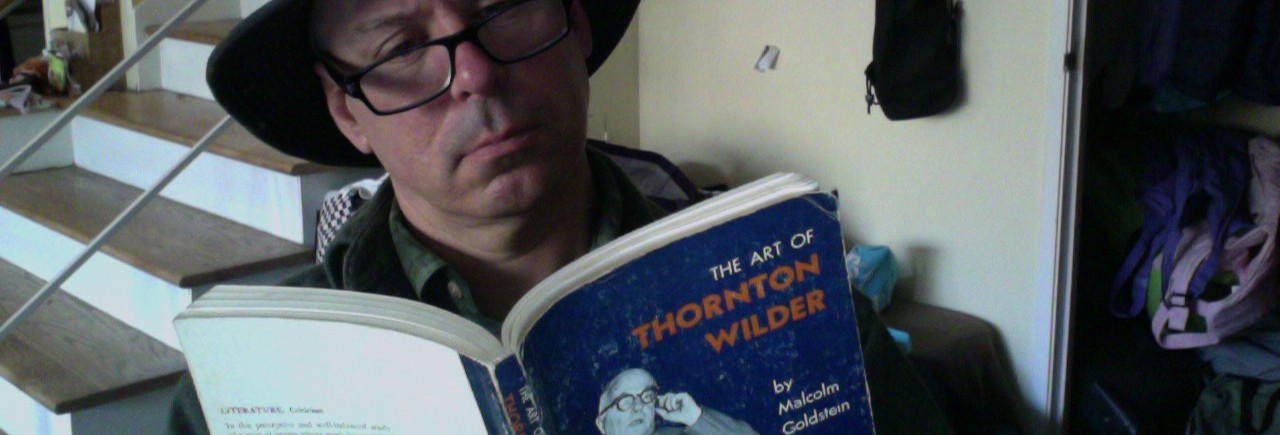
A Streetcar Named Desire
Through October 12. Presented by the Yale Repertory Theatre at the Yale University Theater, 222 York Street, New Haven. (203) 432-1234, www.yalerep.org
By Tennessee Williams. Directed by Mark Rucker. Scenic Designer: Reid Thompson. Costume Designer: Hunter Kaczorowski. Lighting Designer: Stephen Strawbridge. Composer/Sound Designer: Steven Brush. Production Dramaturg: Helen C. Jaksch. Dialect Coach: Jane Guyer Fujita. Fight Director: Rick Sordelet. Casting Director: Tara Rubin. Stage Manager: James Mountcastle. Cast: Rene Augesen (Blanche DuBois), Sarah Soklolovic (Stella Kowalski), Joe Manganiello (Stanley Kowalski), Adam O’Byrne (Harold “Mitch” Mitchell), April Matthis (Eunice Hubbell), Marc Damon Johnson (Steve Hubbell), Phillip Christian (Pablo Gonzales), Mercedes Herrero (Neighbor, Flower Seller, Matron/Nurse), Ken Ruta (Doctor), Nick Erkelens (Young Collector).
Watching A Streetcar Named Desire unfurl on the grand, bright, cinemascope-wide stage at the Yale University Theatre, from a jazzy opening that mimicks the Catfish Row bustle of Porgy & Bess to tranquil tones of neighbors resting on their front stoop, one restless thought kept banging in my brain:
Fuck Marlon Brando.
When we think of A Streetcar Named Desire, we think too often of Marlon Brando, damn it. He took a character who is, appropriately, billed third in this play—behind Blanche and Stella, the greatest Southern sister act since Gone With the Wind—and created a scene-stealing, stage-mauling Method Acting archetype so unstoppable that it became the cliché we still use when deriding naturalistic, musclebound mumbling onstage. Having turned The Method into one big barechested joke, Brando bolted for the big screen, where he continued his megalomaniacal ways, and never returned to the legit stage. A Streetcar Named Desire owes Marlon Brando nothing.
I’m not bashing Brando in order to suggest that Joe Manganiello, who plays Stanley Kowalski in the Yale Rep revival of Streetcar, is better. But Manganiello is, magnificently, a team player. He, along with everyone else on this stage, realizes that A Streetcar Named Desire is an ensemble play. It’s not a hyperpersonalized macho takedown. It evokes a time (post-World War II America) and a place (New Orleans, Louisiana). It depicts not just a family but a surrounding community, a whole way of life.
Stanley appears in far fewer scenes of this play than you may remember. And he interacts with many more people than just his longsuffering (yet readily re-seduced) wife Stella and his somewhat insufferable sister-in-law Blanche. This is a play that begins and ends with that classic theatrical ensemble-cast male-bonding set-up, a card game. (That was in fact the play’s original working title, “The Poker Night.”) Stanley’s the captain of the bowling team. He has a job where he meets and talks to people. This production brings out those details. Manganiello’s initial entrance is as just one of a pack of guys, off to bowl.
Not that Manganiello fades into the background—he’s a big, brooding handsome guy, after all. His suspicious, brooding characters ignites the biggest plot twists in the play. But he gives a balanced, non-showy performance. You can understand why he’s dangerous, but also why people tolerate him and excuse him and befriend him.

But enough about Stanley Kowalski. Let me scream the praises of his Stella, Sarah Sokolovic. She graduated from the Yale School of Drama just a couple of years ago, and it is a great pleasure to have her back. On campus, she appeared in several exceptional ensemble-based student shows: Michael McQuilken’s original rock musical mystery JIB, Lileana Blain Cruz’s folktale pastiche Vaska Vaska Glom and the New York Blackout musical Fly-By-Night. Fresh out of school, she got a Drama Desk nomination for her part in The Shaggs: Philosophy of the World and was in the original production of Lisa D’Amour’s acclaimed drama Detroit. Sokolovic’s Stella is vulnerable yet voluptuous, complicated enough and strong enough to make her more than Stanley’s plaything. She holds her, she talks back to her husband and her sister, and she knows how to have a good time. Her laughs and smiles offer a lot of relief.
The Blanche in this production was a sure thing all along. Rene Augesen’s another School of Drama grad—still others, spanning a couple of decades at the school, include Adam O’Byrne (who plays Blanche’s beau Mitch), Mercedes Herrero (who plays various small parts that add up to help set a tone and pace for the production) and Phillip Christian (poker-playing Pablo). Augesen and director Mark Rucker (Yale also, wouldn’t you know?) have worked together often, and they wrap Tennessee Williams’ poetic turns of phrase around Augesen’s genial jitteriness. With her fragility and her vain attempts to hold onto a sense of decorum, Augesen’s Blanche is a perfectly credible faded flower gone to seed. Just as Manganiello avoids Brandoesque mugging, Augesen sidesteps the sort of genteel Southern belle stereotypes which distinguish the parodies of Williams by such writers as Christopher Durang.
I’ve been a Mark Rucker fan for over 20 years, and this production has a lot in common with the first show of his I ever saw, when he staged the screenplay version of Kaufman & Ferber’s Stage Door. Both that show and this one sought to test the limits of comedy and tragedy in their scripts by elaborating on the central communities which the plays depicted. Both shows also had big sets with cutaway views of whole houses, with curiously skewed angles. The Streetcar set is massive, designed by Reid Thompson so that it even lets up be voyeurs on the upstairs apartment of the Kowalski’s friends Steve and Eunice.
In the case of A Streetcar Named Desire, there’s an exuberance and humor not often seen in productions of this play. It reminds you that the big Southern-based show before Tennessee Williams changed the face of American theater was Tobacco Road, the long-running Jack Kirkland adaptation of Erskine Caldwell’s novel. Like Tobacco Road, this Streetcar can turn from darkness and confusion to goodhearted funning on a dime. And it should. Who says this is a relentlessly bleak drama? Rucker’s provided a full-bodied melodrama, which cascades from one room of the Kowalkski’s two-room flat into the other. He upends the kitchen table and steams up the bedroom scenes. It’s a quick, modern, racy show, but in a comfortable, familiar, old-school proscenium-theater form which I imagine Tennessee Williams would’ve appreciated.
A lot of the Williams plays I’ve seen in recent years— Glass Menagerie at Long Wharf in 2009, Suddenly Last Summer at Westport Playhouse in 2011, In the Bar of a Tokyo Hotel at the Yale Summer Cabaret this past July—all tried very hard to three-dimensionalize the scripts with special effects or layered sets or shadowy projections. Rucker’s gone the other route, back to an essential theatricality. It’s a full, rich, production played out along a flat, linear plane. At one point the whole set literally lurches from side to side. Everything from fights to flirtations to fucks are played out back and forth within the clean frame of that two-story corner building in Elysian Fields, New Orleans.

This is a play about dominating personalities—siblings, lovers, friends. This is a production that sets up a level playing fields, making the battles that much more interesting. As the Yale Rep’s latest challenge to itself to reinvigorate theater classics (joining Paul Giamatti’s Hamlet and Charles Dutton’s Death of a Salesman, to name just two), A Streetcar Named Desire has new stops to make. It’s a worthwhile journey that avoids the usual pitfalls.

Permalink